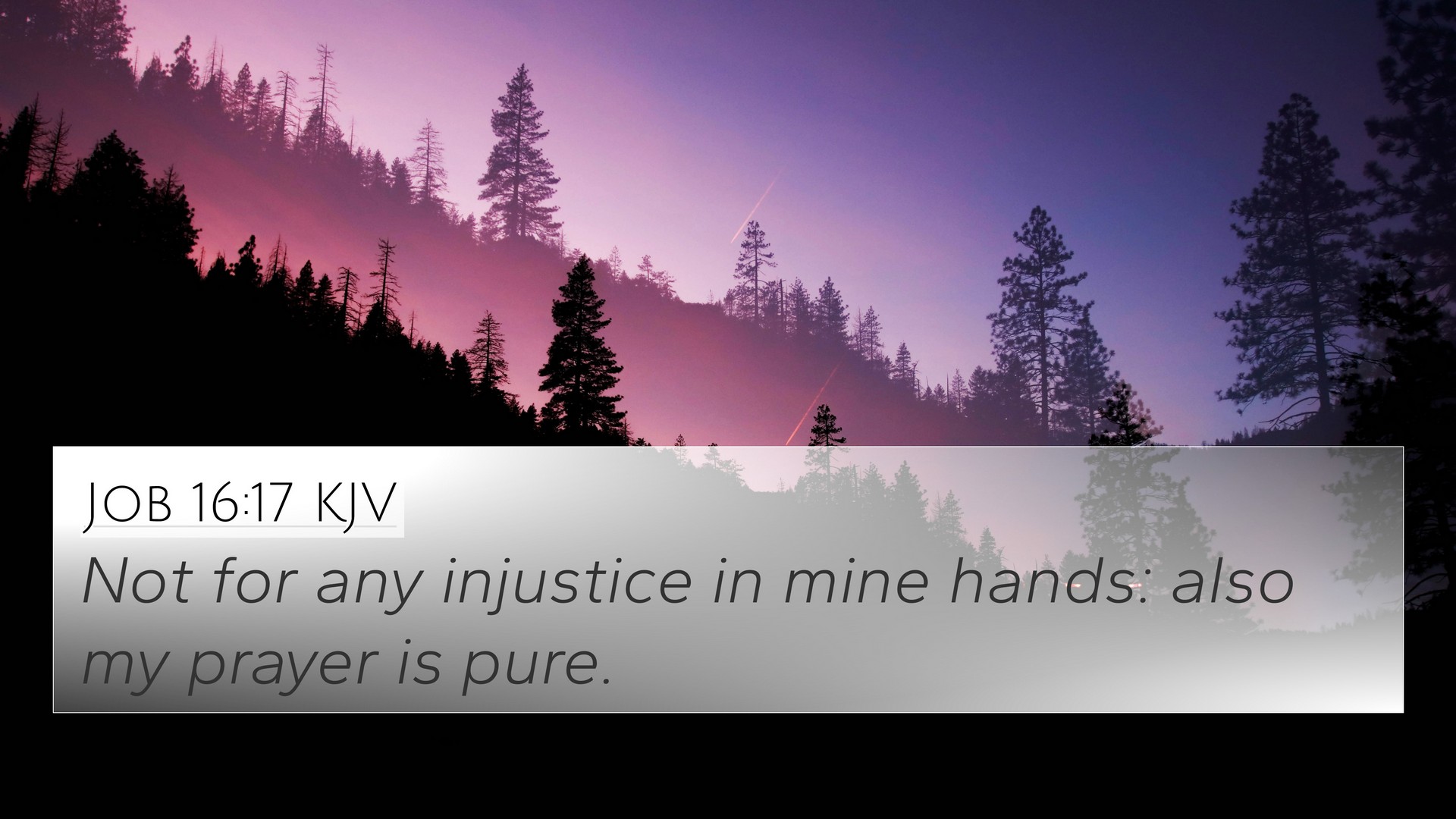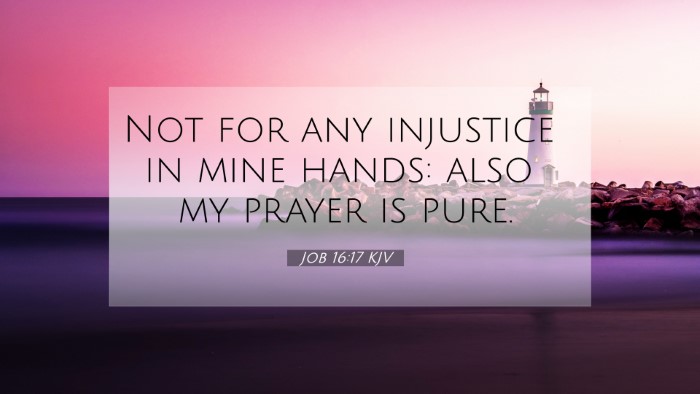Old Testament
Genesis Exodus Leviticus Numbers Deuteronomy Joshua Judges Ruth 1 Samuel 2 Samuel 1 Kings 2 Kings 1 Chronicles 2 Chronicles Ezra Nehemiah Esther Job Psalms Proverbs Ecclesiastes Song of Solomon Isaiah Jeremiah Lamentations Ezekiel Daniel Hosea Joel Amos Obadiah Jonah Micah Nahum Habakkuk Zephaniah Haggai Zechariah MalachiJob 16:17 Similar Verses
Job 16:17 Cross References
Not for any injustice in mine hands: also my prayer is pure.
Uncover the Rich Themes and Topics of This Bible Verse
Listed below are the Bible themes associated with Job 16:17. We invite you to explore each theme to gain deeper insights into the Scriptures.
Job 16:17 Cross Reference Verses
This section features a detailed cross-reference designed to enrich your understanding of the Scriptures. Below, you will find carefully selected verses that echo the themes and teachings related to Job 16:17 KJV. Click on any image to explore detailed analyses of related Bible verses and uncover deeper theological insights.

Proverbs 15:8 (KJV) »
The sacrifice of the wicked is an abomination to the LORD: but the prayer of the upright is his delight.

Job 27:6 (KJV) »
My righteousness I hold fast, and will not let it go: my heart shall not reproach me so long as I live.

Jonah 3:8 (KJV) »
But let man and beast be covered with sackcloth, and cry mightily unto God: yea, let them turn every one from his evil way, and from the violence that is in their hands.

Isaiah 59:6 (KJV) »
Their webs shall not become garments, neither shall they cover themselves with their works: their works are works of iniquity, and the act of violence is in their hands.
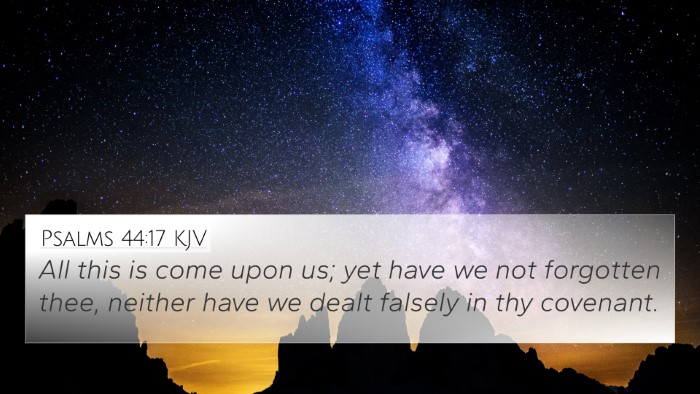
Psalms 44:17 (KJV) »
All this is come upon us; yet have we not forgotten thee, neither have we dealt falsely in thy covenant.
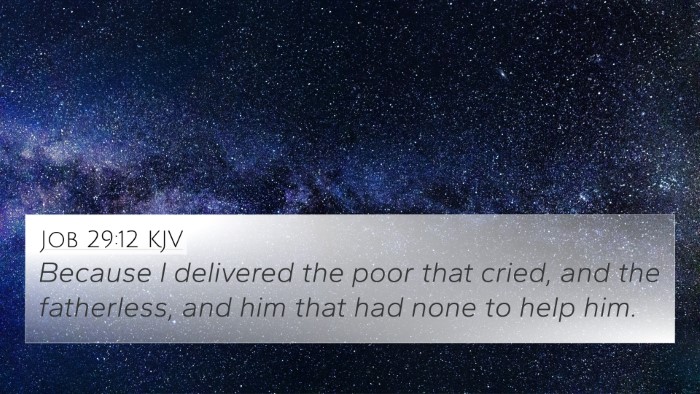
Job 29:12 (KJV) »
Because I delivered the poor that cried, and the fatherless, and him that had none to help him.

Job 11:14 (KJV) »
If iniquity be in thine hand, put it far away, and let not wickedness dwell in thy tabernacles.

Job 21:27 (KJV) »
Behold, I know your thoughts, and the devices which ye wrongfully imagine against me.
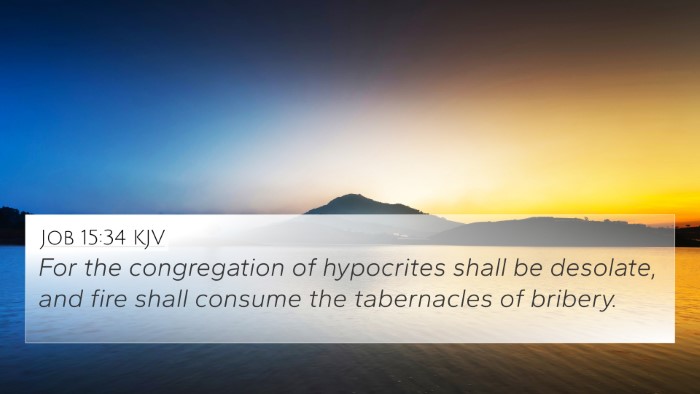
Job 15:34 (KJV) »
For the congregation of hypocrites shall be desolate, and fire shall consume the tabernacles of bribery.
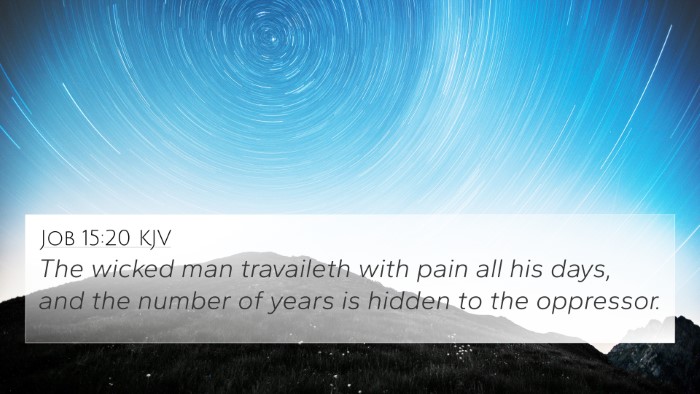
Job 15:20 (KJV) »
The wicked man travaileth with pain all his days, and the number of years is hidden to the oppressor.

1 Timothy 2:8 (KJV) »
I will therefore that men pray every where, lifting up holy hands, without wrath and doubting.
Job 16:17 Verse Analysis and Similar Verses
Understanding Job 16:17
Job 16:17: "Not for any injustice in my hands: also my prayer is pure." This verse captures Job's plea of innocence amidst his suffering, expressing his longing for vindication before God.
Commentary Insights
According to Matthew Henry, Job continues to affirm his integrity while lamenting the harshness of his afflictions. His declarations about his hands being free from injustice underscore his desire to plead his case before God, indicating that he perceives himself as unjustly treated. Henry emphasizes the importance of maintaining a conscience clear before God, paralleling Job's insistence on his purity in prayer.
Albert Barnes elaborates that Job contrasts his plight with an appeal to divine justice. Job's assertion of having pure hands highlights his resolve not to be indicted by stones of reproach from either God or man. Barnes notes that this verse illustrates the human requirement for divine justification—a longing to be understood and vindicated by a higher power.
Adam Clarke interprets the phrase "my prayer is pure" as indicating that in Job's deepest despair, he maintains an unyielding faith in God. Clarke posits that Job's claim reflects his prayer life, which is one of desperation in a search for understanding, yet it is a prayer that is honest and devoid of sin. He stresses the need for sincerity in the believer’s communication with God.
Key Themes and Connections
In this verse, we encounter several important themes:
- Innocence and Integrity: Job's insistence on his innocence points to the broader theme in the Book of Job, which tackles suffering and divine justice.
- The Nature of Prayer: The purity of Job's prayer denotes the essential nature of honest communication with God.
- The Quest for Justice: Job’s appeal reveals the human desire for accountability and vindication in suffering.
Cross-References for Job 16:17
To deepen the understanding of Job 16:17, we can reference several associated verses:
- Job 1:22: "In all this Job did not sin or charge God with wrong." - This supports Job's integrity.
- Job 10:7: "Although You know that I am not guilty, and there is no one to deliver me out of Your hand." - Job reaffirms his plea for recognition of his innocence.
- Job 13:23-24: "How many are my iniquities and sins? Show me my transgression and my sin." - Highlights Job’s desire to understand his faults if he has any.
- Psalm 66:18: "If I regard iniquity in my heart, the Lord will not hear me." - Reflecting on the purity of one’s prayer life.
- Matthew 5:8: "Blessed are the pure in heart: for they shall see God." - Links purity with divine connection.
- Romans 8:31: "What shall we then say to these things? If God be for us, who can be against us?" - Examines God's justice in response to human suffering.
- James 5:16: “The prayer of a righteous person is powerful and effective.” - Relates to Job's assertion of the effectiveness of his prayer.
Thematic Connections
Job 16:17 can be viewed through the lens of several overarching Biblical themes:
- Suffering and Innocence: The duality of unjust suffering is a significant theme in both Job and the New Testament, particularly in the struggles of Jesus.
- The Power of Prayer: Scripture frequently emphasizes sincere prayer as essential for maintaining a relationship with God.
- Divine Justice: The yearning for justice particularly resonates with the Psalms and the prophetic voices concerning righteousness.
Cross-Referencing Biblical Texts
Understanding the connections between Bible verses is crucial for a comprehensive Bible study. Tools for Bible cross-referencing can help identify these thematic threads that weave through scripture. By using a Bible concordance or cross-reference guide, one can effectively navigate the complexities of texts.
Cross-referencing Bible verses provides an enriching context for understanding Job’s declaration in 16:17, offering insights on prayer, integrity, and the nature of suffering in a way that resonates through both Old and New Testament accounts.
Conclusion
Job 16:17 not only serves as a pivotal moment in Job's challenges but also invites the reader to contemplate broader themes of purity in prayer, the pursuit of justice, and unwavering faith amidst tribulation. The related verses enhance the understanding of Job's struggle, creating an inter-Biblical dialogue that reinforces the significance of his experience.
